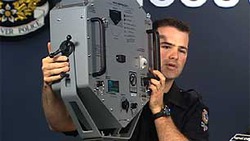Vancouver police get sonic crowd control device
Police say long range acoustic device only for communication
Vancouver police have a new crowd control device capable of emitting painfully loud blasts of sound, just in time for the 2010 Winter Olympics, CBC News has learned.
The medium-range acoustic device (MRAD) can use sound as a weapon, emitting piercing sounds at frequency levels that cross the human threshold of pain and are potentially damaging to hearing, say audio experts.
But it is primarily designed as a communications device that’s clearly audible up to a kilometre away, say police.

Const. Lindsay Houghton said the device was first tested this summer as a public address system during the Celebration of Light fireworks events in Vancouver.
Houghton said police don’t plan to use the device for anything more than communication.
“The primary function we’re using the device for is its ability to communicate with very large groups with respect to crowd control, evacuations, tactical situations where we may need the loudspeaker portion of it,” he said.
Military design put to civilian use
The device — which is a compact version of its predecessor, the Long Range Acoustic Device — can be mounted on top of a vehicle. It is capable of emitting a blast of directional sound measuring an estimated 146 decibels at one metre away and an estimated 99 decibels at 500 metres.
Sound above the range of 120 to 140 decibels is considered painful and damaging to human hearing.
The devices were originally designed for the American military and was first used publicly in North America in September as police in Pittsburgh tried to control anti-G20 demonstrators.
The device has been used in military and civilian ship defence systems to repel would-be pirates, by the U.S. military to drive away insurgents in Iraq and by Japanese whaling ships to drive away protesters.
But police in Vancouver have no plans to use the device as a sonic weapon, said Houghton.
“It was looked at solely for its effectiveness at delivering a message to a large number of people,” said Houghton.
Lack of regulations raises concerns
SFU criminologist David MacAlister, whose research focuses on police powers and civil liberties, said the public should be concerned about the police bringing in new tactics just months before the 2010 Winter Olympic Games.
Anti-Olympics protesters say they are planning large demonstrations during the 2010 Winter Games.Anti-Olympics protesters say they are planning large demonstrations during the 2010 Winter Games. (CBC)
Protesters have threatened to hold large public demonstrations and possibly attempt to disrupt the Games.
“We want to be concerned whenever we’re putting a new weapon in the hands of the police and they’re basically telling us ‘Trust us, we’re not going to use it,’” said MacAlister.
“I’m always concerned when the police have a device like this that can be deployed and have that incidental effect on people who aren’t necessarily the target of its use,” he said.
Protocols and policies must be put in place to govern how the MRAD will be used during the Olympics, MacAlister maintains.
“The very fact they have the device and it has a weapon capability to it, there’s always a risk its going to be used and I think we have to ask some serious questions whether this is the kind of device we want in the hands of the police,” said MacAlister.
“It takes time to get cases into court and get definitive rulings on whether the police should have power or access to a given device,” he said.
Robert Holmes, the president of the B.C. Civil Liberties Association, also is concerned that police have the device.
“We have new gadgets on the go handed out to officers. Who knows what or how they’re going to be used,” said Holmes.
“Backing into things like this without proper public discussion and assuring everyone there are protocols in place for their use is simply not good policy,” said Holmes.
Source: http://www.cbc.ca/canada/british-columbia/story/2009/11/10/bc-long-range-accoustic-device-vancouver-police.html



